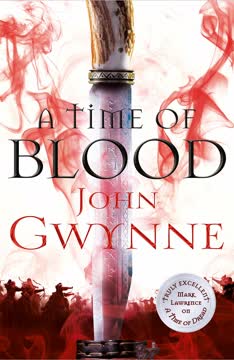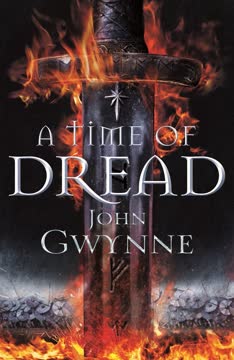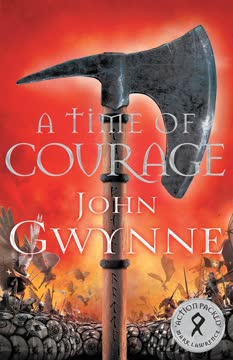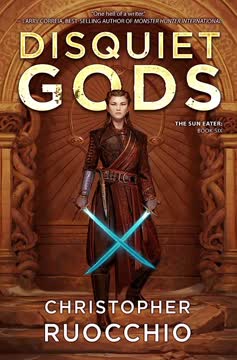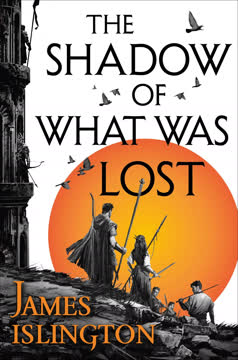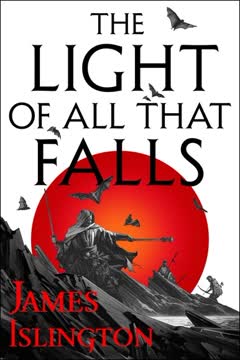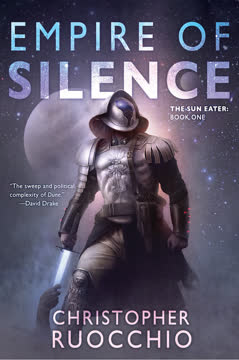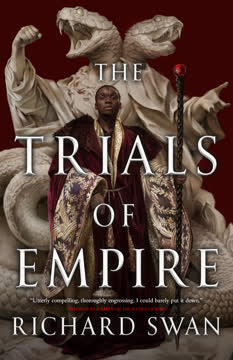Plot Summary
Blood and Betrayal Unleashed
The Banished Lands are gripped by a new, bloodier phase of the ancient conflict between the Ben-Elim, angelic warriors, and the Kadoshim, their demonic foes. Drem, a trapper, is thrust into chaos after witnessing a horrific ritual that transforms Gulla, a Kadoshim leader, into a monstrous Revenant. The fragile peace is shattered as betrayal and violence erupt, with Drem's father slain and his home destroyed. The survivors—Drem, Keld, Cullen, and the giant bear Hammer—flee, carrying with them the burden of loss and the desperate hope of warning the Order of the Bright Star. Grief, guilt, and the thirst for vengeance drive them onward, as the world's old certainties are swept away in a tide of blood.
Wings of Change
Riv, once a loyal White-Wing, awakens to the truth of her heritage: she is a Ben-Elim half-breed, marked for death by the very laws she once served. Her world is upended as she flees with friends Bleda, Vald, and Jost, seeking refuge in the wilds. The revelation of her wings and her parentage—Kol, the ambitious Ben-Elim, is her father—forces Riv to question everything she believed. As she grapples with betrayal and the loss of her mother, Riv's anger and sense of justice ignite. She resolves to confront Kol, not just for herself, but for all those condemned by the old order. The winds of change gather, promising both hope and destruction.
The Red Right Hand
Fritha, once a friend to Drem, now leads the Kadoshim's Red Right Hand, a coven of acolytes and beastly Ferals. Her experiments in blood and bone magic create new horrors—Revenants and Ferals—designed to tip the balance in the Long War. Driven by her own pain and the loss of her child, Fritha's loyalty to Gulla is tested as she seeks power and vengeance. The Red Right Hand becomes a force of terror, hunting Drem and his companions across the wilds, their pursuit relentless and fueled by personal vendettas. Fritha's choices blur the line between victim and villain, as she forges her own legacy in blood.
Shadows in the Forest
Bleda, Sirak prince and ward of the Ben-Elim, finds himself torn between duty, love, and survival. As the Ben-Elim's grip weakens, old rivalries between the Sirak and Cheren clans resurface. Betrayal simmers beneath the surface, with alliances shifting as quickly as the shadows in Forn Forest. Bleda's growing bond with Riv complicates his betrothal to Jin, while the threat of the Kadoshim and their monstrous creations looms ever closer. The forest becomes a crucible, testing loyalties and forcing hard choices as the characters are hunted by both enemies and their own pasts.
Oaths and Revelations
In the aftermath of battle, Riv is captured and forced to confront the truth of her lineage. Kol, now Lord Protector, manipulates events to consolidate his power, demanding oaths of loyalty from Riv and her friends. The revelation that Elyon's Lore—the sacred law—was crafted by the Ben-Elim, not the divine, shakes the foundations of faith and identity. Riv, torn between rage and the need to protect those she loves, swears a reluctant oath, binding herself to Kol's new order. The cost of survival is the sacrifice of vengeance, as old truths die and new ones are born.
The Price of Vengeance
Drem, haunted by the deaths of his father and friends, is driven by a burning need for retribution against Fritha, Gunil, and Gulla. The journey through the Bonefells is a gauntlet of monsters—draigs, wyrms, and Ferals—testing the limits of courage and endurance. Each victory is paid for in blood, and the line between justice and vengeance blurs. Drem's resolve hardens, but so does his understanding of the cost: every act of violence leaves scars, and the cycle of revenge threatens to consume all that is good within him.
The Wolves Gather
The survivors reach Dun Seren, stronghold of the Order of the Bright Star, where Byrne, Ethlinn, and Balur One-Eye muster their forces. Old friendships are rekindled, and new bonds forged in the crucible of shared loss. The Order's traditions—the sword dance, the oath, the training—offer a sense of belonging and purpose. Yet the threat of Gulla's army, now swelled by Revenants and Ferals, demands unity among all peoples: men, giants, and even the Ben-Elim. The wolves gather, preparing to face the coming storm, as hope and fear mingle on the eve of battle.
The Hunt Begins
Fritha's relentless pursuit of Drem and his companions leads to a deadly game of cat and mouse through the Bonefells and Desolation. Traps are set, alliances tested, and the hunted become hunters in turn. The landscape itself becomes a character—treacherous, wild, and unforgiving. As Fritha's warband grows with new horrors, Drem and his friends must rely on cunning, courage, and the bonds of loyalty to survive. The hunt is not just for survival, but for the soul of the Banished Lands.
Draigs and Desperation
The emergence of draigs—ancient, deadly beasts—signals a new escalation in the war. Drem and his allies face impossible odds as they are beset by monsters both natural and unnatural. The battle with the draig is a turning point, testing the limits of heroism and sacrifice. Losses mount, and the survivors are forced to confront the reality that victory may come at the cost of everything they hold dear. Yet in the darkest moments, acts of courage and compassion kindle hope, even as desperation grows.
The Court of Swords
In Dun Seren, Kol's claim over Drem is challenged by Byrne in the ancient Court of Swords. The duel is not just a contest of arms, but a clash of ideals—freedom versus tyranny, truth versus manipulation. Byrne's victory secures Drem's place among the Order and signals a shift in the balance of power. The outcome reverberates through the ranks, inspiring hope and defiance. Yet the cost is high, as old wounds are reopened and the specter of war looms ever larger.
The Sirak's Last Stand
Bleda and the Sirak, allied with the Cheren, march to confront the Kadoshim threat. But treachery is revealed as Uldin and Jin betray the Sirak, turning on their kin at the moment of greatest peril. The Sirak are slaughtered, Erdene falls, and Bleda is left broken and vengeful. The battle is a microcosm of the larger war—honor and loyalty crushed beneath the weight of ambition and deceit. The last stand of the Sirak becomes a legend of loss, sacrifice, and the bitter taste of betrayal.
The Order Musters
The Order of the Bright Star, giants, and their allies gather for the final confrontation. Training intensifies, oaths are renewed, and the sword dance becomes both ritual and preparation. Drem, Cullen, and Keld find their place among the warriors, each carrying the scars of their journey. The muster is a moment of unity and resolve, as the disparate peoples of the Banished Lands set aside old grievances to face a common enemy. The stage is set for the war that will decide the fate of all.
The Sword Dance
The sword dance, a symbol of the Order's heritage, becomes a metaphor for the struggle between old and new. As warriors train and prepare, the dance weaves together past and present, forging a sense of identity and purpose. Drem, once an outsider, finds belonging in the rhythm of the dance and the camaraderie of his peers. The dance is both preparation for battle and a reminder of what is at stake—the preservation of hope, honor, and the possibility of a better world.
The Revenant Tide
Gulla unleashes his greatest weapon: the Revenants, an army of the dead, sweeping across the battlefield in a tide of horror. The Order and its allies are overwhelmed, their lines broken by the relentless assault. Ethlinn's magic and the rune-marked blades of the Order offer some resistance, but the cost is staggering. The battle becomes a desperate struggle for survival, as the living are hunted by the dead. The tide threatens to drown all hope, and only acts of extraordinary courage can turn the tide.
The Siege of Drassil
Gulla's true plan is revealed as the Cheren, in league with the Kadoshim, betray Drassil from within. The gates are thrown open, and the Revenant horde pours into the city. Riv races to warn the defenders, but arrives too late to prevent catastrophe. The siege is a nightmare of chaos, betrayal, and slaughter, as the last bastion of the Ben-Elim and their allies is overrun. The fall of Drassil marks the darkest hour, as the forces of darkness seem poised to claim ultimate victory.
Wrath Ascendant
Fritha's greatest creation, the draig Wrath, takes flight, sowing destruction among friend and foe alike. The boundaries between human and monster blur, as Fritha, Morn, and Elise embrace their monstrous natures in pursuit of vengeance. The battlefield becomes a crucible of transformation, where old identities are shed and new ones forged in fire and blood. Wrath's ascendance is both a symbol of the world's descent into chaos and a harbinger of the final reckoning to come.
The Fall of Heroes
The cost of war is measured in the fall of heroes—Sig, Erdene, and countless others. Bleda's world is shattered by loss and betrayal, while Drem, Riv, and their companions are forced to confront the limits of their strength and the price of their choices. The old order crumbles, and the survivors must find meaning in the ashes. Yet even in defeat, acts of love, sacrifice, and defiance plant the seeds of new legends, as the torch is passed to a new generation.
The Awakening of Asroth
In the heart of Drassil, Fritha and Gulla shatter the starstone prison, awakening Asroth, Lord of the Kadoshim. The ancient enemy rises, and the world stands on the brink of annihilation. Riv, Drem, and their allies are scattered, battered, but not broken. The final lines are drawn, as hope and darkness prepare for the last battle. The awakening of Asroth is both a culmination and a new beginning, as the fate of the Banished Lands hangs in the balance.
Characters
Drem
Drem is a trapper from the Desolation, thrust into the heart of the Long War after witnessing the horrors unleashed by the Kadoshim. The murder of his father and the destruction of his home awaken a deep sense of guilt and a burning need for vengeance. Drem is introspective, methodical, and struggles with anxiety, often seeking comfort in the steady beat of his pulse. His journey is one of transformation—from outsider to warrior, from victim to protector. Drem's relationships with Keld, Cullen, and Byrne anchor him, while his enmity with Fritha and Gulla drives his actions. His arc is defined by the tension between justice and revenge, and his gradual acceptance of responsibility and belonging within the Order of the Bright Star.
Riv
Riv is a White-Wing warrior whose discovery of her Ben-Elim heritage marks her as an abomination in the eyes of her people. Her world is shattered by betrayal, loss, and the revelation that Kol, the new Lord Protector, is her father. Riv is impulsive, passionate, and driven by a powerful sense of justice. Her relationships—with her sister/mother Aphra, her friends Bleda, Vald, and Jost, and her complicated bond with Kol—are fraught with love, anger, and longing. Riv's journey is one of self-discovery, as she learns to embrace her wings, her power, and her right to exist. Her struggle against prejudice and her fight for a new order make her a symbol of hope and change.
Fritha
Fritha is a former friend to Drem, now the ruthless leader of the Kadoshim's Red Right Hand. Scarred by the loss of her child and the betrayal of the Ben-Elim, Fritha channels her pain into dark magic, creating Revenants and Ferals to serve her vengeance. She is brilliant, driven, and increasingly unmoored from her humanity. Fritha's relationships—with Gulla, Morn, Arn, and Elise—are complex, marked by loyalty, manipulation, and shared trauma. Her arc is a descent into monstrosity, but also a tragic quest for meaning and agency in a world that has wronged her. Fritha embodies the dangers of unchecked ambition and the corrosive power of hate.
Bleda
Bleda is the son of Erdene, Queen of the Sirak, and a ward of the Ben-Elim. Trained to mask his emotions, Bleda is stoic, loyal, and deeply conflicted. His love for Riv and his sense of duty to his clan and his betrothed, Jin, pull him in opposing directions. The betrayal by Uldin and Jin, and the slaughter of his people, leave Bleda broken and vengeful. His arc is one of loss, resilience, and the search for identity in a world where trust is a luxury. Bleda's relationships—with Riv, Erdene, Jin, and his honor guard—are marked by loyalty, sacrifice, and the pain of impossible choices.
Kol
Kol is a Ben-Elim who seizes power as Lord Protector after orchestrating the death of Israfil. Charismatic, cunning, and ruthless, Kol is both Riv's father and her greatest antagonist. He is driven by a vision of a new order, willing to bend or break any law to achieve his goals. Kol's relationships—with Riv, Aphra, Hadran, and the other Ben-Elim—are defined by manipulation, betrayal, and the pursuit of power. His arc explores the costs of ambition, the dangers of moral relativism, and the complexities of love twisted by control.
Gulla
Gulla is the High Captain of the Kadoshim, transformed into a Revenant and architect of the new tide of darkness. He is cold, calculating, and utterly devoted to the destruction of the Ben-Elim and the subjugation of the Banished Lands. Gulla's relationships—with Fritha, Morn, Ulf, and the Seven—are marked by dominance, manipulation, and the creation of monsters. His arc is one of escalation, as he unleashes ever greater horrors in pursuit of victory. Gulla embodies the seductive allure of power and the nihilism at the heart of the Kadoshim.
Byrne
Byrne is the High Captain of the Order of the Bright Star, a descendant of Corban and Cywen. Wise, disciplined, and fiercely protective, Byrne anchors the Order through crisis and loss. Her relationships—with Drem, Keld, Cullen, and the giants—are defined by loyalty, mentorship, and a deep sense of responsibility. Byrne's arc is one of leadership under fire, as she balances tradition and innovation, justice and pragmatism. She is a symbol of hope and resilience, embodying the best of the old world while guiding her people into the new.
Keld
Keld is a veteran of the Order, a master huntsman whose skills and wisdom are vital to the survival of Drem and his companions. Gruff, practical, and fiercely loyal, Keld is haunted by loss but driven by duty. His relationships—with Drem, Cullen, Fen, and Hammer—are marked by camaraderie, mentorship, and shared hardship. Keld's arc is one of endurance, as he faces the horrors of war with courage and humor, never losing sight of what matters most.
Cullen
Cullen is a young, red-haired descendant of Corban, known for his bravado, humor, and skill with a blade. He is quick to laugh, quick to fight, and fiercely loyal to his friends. Cullen's relationships—with Drem, Keld, Byrne, and the crows—are defined by friendship, rivalry, and a shared sense of purpose. His arc is one of growth, as he learns the costs of war and the value of humility, emerging as a true hero in his own right.
Morn
Morn is the daughter of Gulla, a Kadoshim half-breed driven by the need to avenge her brother's death. Mercurial, powerful, and often unpredictable, Morn's loyalty is tested as she navigates the shifting alliances of war. Her relationships—with Gulla, Fritha, and the other half-breeds—are marked by grief, rage, and the search for belonging. Morn's arc is one of transformation, as she struggles to define herself in a world that sees her as both weapon and abomination.
Plot Devices
Duality of Blood and Identity
The narrative is driven by the tension between heritage and choice—Ben-Elim, Kadoshim, human, half-breed. Characters are forced to confront the meaning of blood: is it a curse, a blessing, or simply a fact? The motif of blood recurs in rituals, oaths, and battles, symbolizing both connection and division. The struggle to define oneself against the weight of ancestry is central, with characters like Riv, Drem, and Fritha embodying the conflict between what they are and what they choose to become.
Cycles of Betrayal and Vengeance
Betrayal is a constant—between clans, within families, among friends. The narrative structure uses foreshadowing and parallelism to highlight the cyclical nature of vengeance and the futility of old grudges. The betrayals of Uldin and Jin echo the ancient enmities that fuel the Long War. The desire for revenge drives characters to both heroism and monstrosity, blurring the line between justice and cruelty.
Transformation and Monstrosity
The use of blood magic, the creation of Revenants and Ferals, and the awakening of ancient monsters serve as both literal and metaphorical transformations. Characters are changed by loss, grief, and power—sometimes becoming monsters, sometimes transcending their limitations. The motif of transformation is mirrored in the shifting alliances and the collapse of old orders, as the world itself is remade in fire and blood.
The Sword Dance and Ritual
The sword dance and the rituals of the Order provide structure and meaning amid chaos. These traditions are both a source of strength and a means of adaptation, allowing characters to find identity and purpose. The narrative uses these rituals to foreshadow key events, reinforce themes of unity and resilience, and contrast the Order's values with the chaos of the Kadoshim.
The Court of Swords and the Power of Oaths
The Court of Swords, where disputes are settled by duel, symbolizes the tension between law and violence, tradition and change. Oaths—sworn in blood, on swords, or in desperation—bind characters to causes and to each other. The breaking and keeping of oaths drive the plot, with the consequences of loyalty and betrayal rippling through every relationship.
Analysis
A Time of Blood is a sweeping epic of transformation, loss, and the relentless pursuit of justice in a world where the boundaries between good and evil, human and monster, are ever shifting. John Gwynne crafts a narrative that interrogates the meaning of blood—heritage, loyalty, sacrifice—and the ways in which it both binds and divides. The novel explores the costs of vengeance and the corrosive power of hate, while also celebrating the resilience of hope, love, and friendship. Through its complex characters—each wrestling with identity, duty, and the scars of betrayal—the story asks whether it is possible to break the cycles of violence that define the Banished Lands. The rise of new monsters, both literal and figurative, mirrors the collapse of old certainties and the birth of a new, uncertain order. Ultimately, A Time of Blood is a meditation on the necessity of change, the courage to choose one's own path, and the enduring power of oaths and community in the face of overwhelming darkness.
Last updated:
Review Summary
A Time of Blood is a thrilling sequel that delivers intense action, epic battles, and character growth. Readers praise Gwynne's masterful writing, particularly his ability to craft vivid fight scenes and develop complex characters. The novel expands on the world-building and moral ambiguity established in the first book, with many citing Drem as a standout character. While some found the pacing relentless, most reviewers were captivated by the story's twists and emotional impact, eagerly anticipating the trilogy's conclusion.
